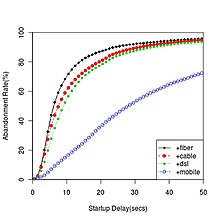Psychological effects of Internet use
[1] American writer Nicholas Carr asserts that Internet use reduces the deep thinking that leads to true creativity.
Carr also states that the vast availability of information on the World Wide Web overwhelms the brain and hurts long-term memory.
He says that "experience does not revamp the basic information-processing capacities of the brain" and asserts that the Internet is actually making people smarter.
[11] The BBC describes the research published in the peer-reviewed science journal PLoS ONE: Specialised MRI brain scans showed changes in the white matter of the brain—the part that contains nerve fibres—in those classed as being web addicts, compared with non-addicts.
Dr. Small concluded that "The current explosion of digital technology not only is changing the way we live and communicate, but is rapidly and profoundly altering our brains.
Lead researcher Professor Gary Small said: "The study results are encouraging, that emerging computerized technologies may have physiological effects and potential benefits for middle-aged and older adults.
He writes that they can destroy privacy, and notes that "Insurance companies have accessed their patients' Facebook accounts to try to disprove they have hard-to-verify health problems like depression; employers have checked social networking sites to vet future employees; university authorities have searched the web for photos of their students' drinking or smoking pot."
Psychology researcher John Suler differentiates between benign disinhibition in which people can grow psychologically by revealing secret emotions, fears, and wishes and showing unusual acts of kindness and generosity and toxic disinhibition, in which people use rude language, harsh criticisms, anger, hatred and threats or visit pornographic or violent sites that they wouldn't in the 'real world.
Kimberly S. Young[27] links internet addiction disorder with existing mental health issues, most commonly depression.
"Aric Sigman's presentation to members of the Royal College of Paediatrics and Child Health outlined the parallels between screen dependency and alcohol and drug addiction: the instant stimulation provided by all those flickering graphics leads to the release of dopamine, a chemical that's central to the brain's reward system".
The results of the scan revealed that online gaming addiction "impairs gray and white matter integrity in the orbitofrontal cortex of the prefrontal regions of the brain".
[31] As a result, Keith Low believes that these online gaming addicts are incapable of prioritizing their life or setting a goal and accomplishing it because of the impairment of their orbitofrontal cortex.
Stanford psychiatrist Dr. Elias Aboujaoude believes that advances in virtual reality and immersive 3-D have led us to "where we can have a 'full life' [online] that can be quite removed from our own."
In 2009, a three-year-old girl from New Mexico died of malnutrition and dehydration on the same day that her mother was said to have spent 15 hours playing World of Warcraft online.
[33] In another case in 2014, a Korean couple became so immersed in a video game that allowed them to raise a virtual child online that they let their real baby die.
Overall, parents are seen to do simple tasks such as sending e-mails and keep up with current events whereas social networking sites are less frequented.
[44] They feel that it is a valuable commodity that can enhance their learning experience and when used in this manner it does not contribute to any family tension or conflicts.
Parents are active in monitoring their child's online use by using methods such as investigating the browsing history and by regulating Internet usage.
[45] Conversely an American study, conducted by PewInternet released on 20 November 2012, reveal that parents are highly concerned about the problems the Internet can impose on their teenage children.
This study forms its basis around Marvin Sussman and Suzanne Steinmetz's idea that the relationship between parent and child is highly influenced by the changing experiences and events of each generation.
This fosters teaching in a positive environment, which sustains a strong relationship between mother and child, encourages education, and promotes mature behaviour.
"Cooler" mothers only allowed themselves to be taught if they thought that their child held the same amount of knowledge or greater and would dismiss the teaching otherwise suggesting a relationship that stems from the majority of influence coming from the parent.
Katz notes that the majority resources that immigrants find helpful are located online, however the search algorithms currently in place do not direct languages other than English appropriately.
[49] The Internet is increasingly being used as a virtual babysitter when parents actively download applications specifically for their children with intentions to keep them calm.
A survey conducted by Ipsos has found that half of the interviewed parents believe children ages 8–13 are old enough to own or carry smartphones thus increasing online content consumption in younger generations.
